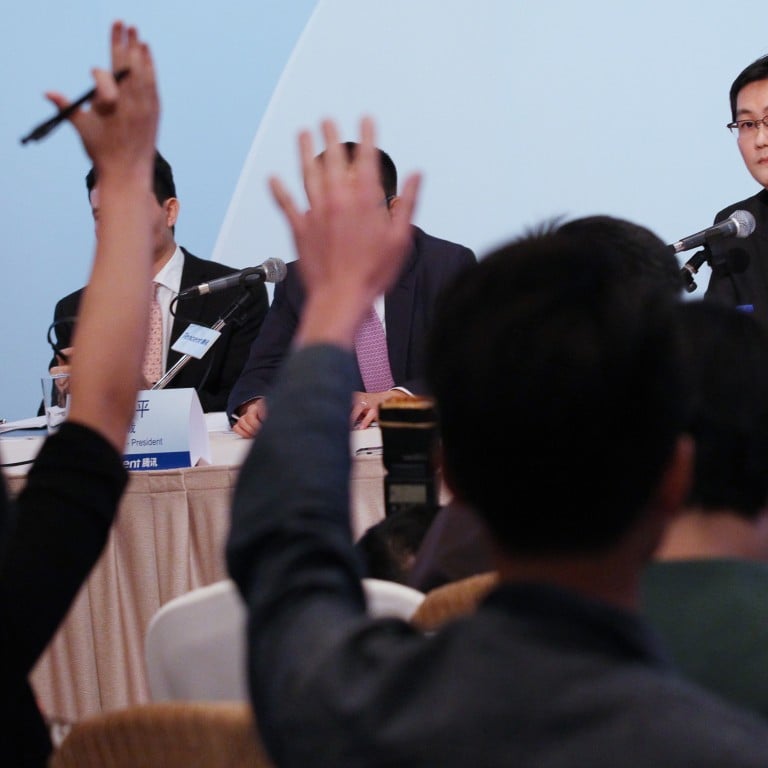
'Copycat' Tencent boss calls for China to strengthen intellectual property laws
Pony Ma Huateng, Tencent’s boss whose early products were widely seen as copycats, has called on China’s legislature to tighten enforcement of the mainland’s intellectual property laws and punish wrongdoers harder.
Some mainland companies trampled on others’ intellectual property rights because they knew they would not face heavy penalties even if they were caught, said the chairman and chief executive of the mainland’s second biggest internet company.
"I can't overstate the importance of rule of law. I have said on different occasions that many of the questions boil down to lax law enforcement,” he told reporters in Beijing on Wednesday night.
“Tencent has won many lawsuits, and … received millions in damages in the highest case, which wasn’t bad, but it doesn’t amount to much of a deterrent, given they might have made hundreds of millions in US dollars elsewhere,” Ma said.
“They know very well it’s against the law, but since the risk isn't huge they would still do it. This is sad,” he said. “That’s why I think punishment isn’t stringent enough, and we hope law enforcement could become more rigorous, and punishment heavier."
“It doesn’t deter violators at all, therefore often you’ll find it’s a case of bad money drives out good."
But bad money certainly did not drive out good when Ma co-founded Tencent in 1998 and launched OICQ, widely seen as an imitation of ICQ (then owned by AOL), in the same year. He changed its name to QQ after an intellectual property dispute with ICQ, though some reports say AOL brought Tencent to court.
Many of Tencent's other early products, including web portals, marketplaces, and games, were also widely seen as knockoffs of successful products at the time, giving Ma a reputation for quickly copying success before making slight adjustments to improve user experience.
The company, nonetheless, has gradually shaken off its image as a copycat with its products in recent years. One of the foremost is WeChat, the most popular instant messaging app in the mainland with about 468 million monthly users. QQ also remains a very popular messaging tool.
Tencent's video games, the firm's main cash cow, are among the country's most popular and the company's mobile games regularly top download charts.
The Shenzhen-based firm is now one of the world's most influential internet companies, ranking fifth in the world, after Google, Amazon, Alibaba, and Ebay.
Ma's push for tighter IP laws comes after Tencent invested heavily in film, TV shows and music content in recent years. In 2014, it signed a major deal with HBO to make its TV shows and movies available on a broad basis in China for the first time.
According to the State Intellectual Property Office, China has significantly increased its number of intellectual property applications. In February the office said it had handled 928,000 applications for invention patents in 2014, a year-on-year increase of 12.5 per cent putting the mainland ahead of all other countries for filed patents for the fourth year in a row.
That is despite are doubts about the quality of many patent applications, which are driven some say by imposed quotas, directives, tax benefits or other incentives.
Although authorities had been promoting more protection and stricter law enforcement, they were wary of stifling the country's economy, especially the technology sector, which is still transitioning from copying the West to being a self-reliant innovator, said You Yunting, an intellectual property lawyer in Shanghai.
"Copycatting is very common in China mainly because the authorities aren't determined enough to tackle the issue, and court penalties are generally far too lenient, so the deterrent effect isn't there," he said.
Apart from pushing for tougher IP law enforcement, other proposals Ma submitted to the legislature include encouraging entrepreneurship and innovation, making better use of mobile internet in public facilities such as transport, hospitals, and environmental protection, and giving the elderly and the disabled equal access to the internet.
